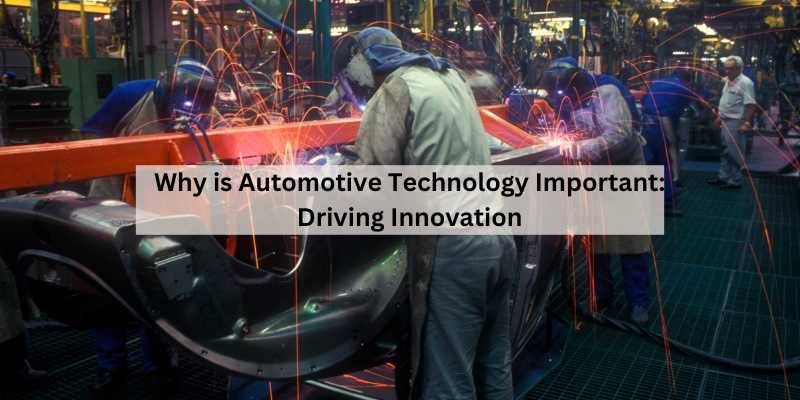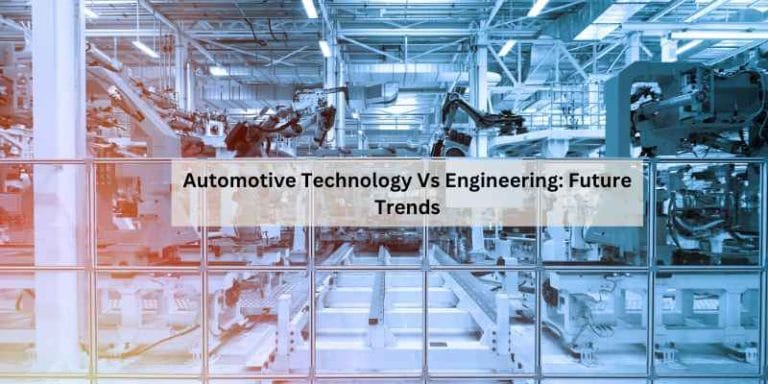Why is Automotive Technology Important: Driving Innovation
Automotive technology is important for reducing traffic jams, saving fuel, and cutting greenhouse gas emissions. Automated driving systems can enhance fuel efficiency by minimizing unnecessary braking and acceleration.
Moreover, vehicles equipped with fully automated systems can travel closer together, reducing air drag and fuel consumption. The significance of automotive technology extends to improving vehicle performance, efficiency, and safety, as well as aiding in emission reduction and compliance with standards.
By leveraging technology, manufacturers can develop safer and more efficient vehicles, providing enhanced value to consumers. The continuous advancements in automotive technology play a crucial role in shaping the future of transportation and driving positive environmental impacts.
The Driving Force Of Automotive Technology
Automotive technology plays a pivotal role in shaping our world today. It not only revolutionizes the way we travel but also contributes significantly to economic growth, employment opportunities, and career growth. Let’s explore the driving force behind automotive technology and its impact on various aspects of our lives.
The Role In Economic Growth
The automotive industry is a key driver of economic growth in many countries. It stimulates economic activity through various means, such as manufacturing, sales, and aftermarket services. The production of vehicles and their components creates a ripple effect, generating employment, attracting investments, and fostering innovation. Additionally, automotive technology drives the growth of related industries, including transportation, logistics, and infrastructure development.
Moreover, the automotive sector contributes to national and global trade, promoting exports and generating revenue. It fosters international collaborations and partnerships, further enhancing economic development. The continuous advancements in automotive technology lead to the creation of high-value products and services, ultimately boosting productivity and competitiveness in the global market.
Employment Opportunities And Career Growth
The automotive industry offers a wide range of employment opportunities and promising career growth prospects. It encompasses various sectors, such as manufacturing, research and development, sales and marketing, customer service, and technical support. Skilled professionals are in demand to design, engineer, and produce vehicles with cutting-edge technology.
Furthermore, automotive technology creates a demand for specialized roles, such as automotive engineers, electric vehicle technicians, data analysts, and software developers. As the industry continues to evolve, new job roles emerge, providing opportunities for continuous learning and skill development. This dynamic sector offers a platform for individuals to pursue their passion and contribute to the advancement of automotive technology.
The growth of the automotive industry also stimulates the growth of related industries, such as automotive services, spare parts manufacturing, and transportation services. This, in turn, creates additional employment opportunities and career pathways for individuals interested in these sectors.
Whether it’s working on the development of autonomous vehicles, improving fuel efficiency, or enhancing safety features, the automotive industry offers a diverse range of career options for individuals with a passion for technology and innovation.
In conclusion, automotive technology serves as a driving force behind economic growth, employment opportunities, and career growth. Its continuous advancements not only shape the way we travel but also contribute to the overall development of society. With the ever-increasing demand for efficient, sustainable, and technologically advanced vehicles, the automotive industry holds immense potential for individuals seeking a rewarding and impactful career.
Safety Enhancements Through Innovation
When it comes to automotive technology, one of the most critical aspects is the safety enhancements achieved through innovation. These advancements play a vital role in improving the overall safety of vehicles, reducing the likelihood of accidents, and minimizing the severity of collisions.
Advances In Collision Avoidance
Automotive technology has led to significant advances in collision avoidance systems. These systems utilize sensors and advanced algorithms to detect potential collision risks and provide warnings to the driver. In some cases, the technology can even intervene by automatically applying the brakes or steering to avoid an impending collision.
Impact Of Automated Driving Systems
Automated driving systems represent a monumental leap in automotive safety technology. These systems leverage advanced sensors, cameras, and artificial intelligence to enable vehicles to navigate and operate autonomously. By reducing the reliance on human drivers, automated driving systems have the potential to significantly decrease the occurrence of accidents caused by human error.
Environmental Impacts And Sustainability
Automotive technology plays a crucial role in addressing environmental impacts and promoting sustainability. Through advancements in vehicle technology, the automotive industry is striving to reduce emissions and improve fuel efficiency, ultimately contributing to a greener and more sustainable future.
Reducing Emissions With Cleaner Technologies
In the pursuit of environmental sustainability, automotive technology has led to the development of cleaner technologies that significantly reduce harmful emissions. These advancements include the integration of electric and hybrid propulsion systems, as well as the implementation of advanced emission control systems, effectively minimizing the environmental impact of vehicular emissions.
Fuel Efficiency Improvements
One of the key priorities of automotive technology is to enhance fuel efficiency, thereby reducing the overall carbon footprint of vehicles. This is achieved through the use of innovative engine designs, lightweight materials, aerodynamic enhancements, and the adoption of alternative fuel sources, all of which contribute to greater fuel economy and reduced greenhouse gas emissions.
The Evolution Of Vehicle Performance
Automotive technology is crucial for improving vehicle performance, efficiency, and safety. It plays a vital role in reducing emissions, enhancing fuel economy, and ensuring compliance with vehicle emission standards. Additionally, it is used in manufacturing to create safer and more efficient vehicles, offering maximum value to consumers.
The Evolution of Vehicle Performance has been a long and exciting journey, with the use of technology playing a crucial role. Automotive technology has enabled manufacturers to optimize engine efficiency, increase power and agility, and improve overall safety. Let’s dive deeper into some of the specific ways technology has impacted the evolution of vehicle performance.
Optimizing Engine Efficiency
Automotive technology has allowed for the creation of engines that are more efficient and environmentally friendly. With advancements in engine design, fuel injection systems, and the use of lightweight materials, cars can now travel further on less fuel, reducing emissions and saving drivers money. In addition, hybrid and electric vehicles have become increasingly popular, providing even greater fuel efficiency and reduced environmental impact.
The Pursuit Of Power And Agility
While efficiency is important, drivers also want a vehicle that is powerful and agile. Automotive technology has allowed manufacturers to achieve both, with the use of turbocharging, direct injection, and other performance-enhancing technologies. These advancements have led to faster and more responsive vehicles, providing drivers with a more enjoyable and engaging driving experience.
In conclusion, the evolution of vehicle performance has been greatly influenced by advancements in automotive technology. With the optimization of engine efficiency and the pursuit of power and agility, technology has played a crucial role in creating safer, more efficient, and enjoyable vehicles for consumers.
Navigating The Future With Telematics
Enhancing the automotive landscape, telematics paves the way for advanced connectivity and real-time data analysis, revolutionizing vehicle performance and safety. With telematics, drivers can navigate the future confidently, benefiting from improved efficiency and streamlined operations in the automotive industry.
Data-driven Decision Making
Utilizing telematics data for informed decisions.
Enhanced Connectivity On The Move
Stay connected seamlessly while on the move.
Navigating the Future with Telematics
In today’s automotive landscape, telematics plays a crucial role in shaping the way we interact with vehicles. From data-driven decision making to enhanced connectivity on the move, telematics is revolutionizing the driving experience.
Data-driven Decision Making
Access real-time data for making smarter choices.
Enhanced Connectivity On The Move
Enjoy continuous connectivity for a seamless journey.
Automotive Technology In Manufacturing
The application of automotive technology in manufacturing plays a crucial role in improving vehicle performance, efficiency, and safety. It is utilized to create safer and more efficient vehicles that provide maximum value for consumers.
Precision And Automation In Production
Automotive technology enables precision and automation in the production processes, leading to increased efficiency and accuracy. This results in the timely assembly of vehicle components and reduces the margin of error in manufacturing.
Quality Assurance And Control
Through automotive technology, manufacturers can implement robust quality assurance and control measures. This ensures that every vehicle meets stringent quality standards, leading to enhanced reliability and customer satisfaction.
Consumer Benefits And Value
Automotive technology is important as it improves vehicle performance, efficiency, and safety. It also reduces emissions, improves fuel economy, and ensures compliance with vehicle emission standards. This technology helps in the manufacturing of safer and more efficient vehicles that provide maximum value for consumers.
Cost Savings Over Vehicle Lifespan
Personalization And User Experience
Challenges And Opportunities Ahead
Automotive technology plays a crucial role in improving vehicle performance, efficiency, and safety. It also helps in reducing emissions, enhancing fuel economy, and ensuring compliance with vehicle emission standards. With the advancements in automotive technology, there are opportunities to create safer and more efficient vehicles, providing maximum value for consumers while addressing the challenges of environmental impact and transportation needs.
Keeping Pace With Rapid Innovation
Automotive technology faces the challenge of keeping up with rapid innovations in the industry. This requires continuous learning and adaptation.
Ethical Considerations In Automation
Automation raises ethical concerns such as data privacy, liability issues, and the impact on employment. Addressing these is crucial for the industry’s sustainable growth.
Frequently Asked Questions
Why Is Vehicle Technology Important?
Vehicle technology is important for improving performance, efficiency, and safety. It helps reduce emissions, improve fuel economy, and ensure compliance with standards. Additionally, it is used in manufacturing to create safer and more efficient vehicles, providing maximum value for consumers.
What Is The Use Of Automotive Technology?
Automotive technology is important because it improves vehicle performance, efficiency, and safety. It helps reduce emissions, improve fuel economy, and ensure compliance with vehicle emission standards. It is also used in manufacturing to create safer and more efficient vehicles that provide maximum value for consumers.
Additionally, automotive technology plays a pivotal role in driving vehicle safety, efficiency, and performance.
Why Is The Automotive Industry So Important?
The automotive industry is important because it contributes to the economy, improves vehicle performance and safety, reduces emissions, and creates jobs. Automotive technology plays a crucial role in achieving these benefits by enhancing vehicle efficiency, fuel economy, and compliance with emission standards.
Additionally, it enables the manufacturing of safer and more efficient vehicles, providing value to consumers.
Why Study Automotive Technology?
Studying automotive technology teaches you safety practices, vehicle systems and service, testing and troubleshooting, and more. It helps improve vehicle performance, efficiency, and safety while reducing emissions and ensuring compliance with vehicle standards. Plus, it can prepare you for a career as a master mechanic or specialty technician in the automotive industry.
Conclusion
Overall, automotive technology plays a crucial role in improving vehicle performance, efficiency, and safety. It helps reduce emissions, improve fuel economy, and ensure compliance with vehicle emission standards. In addition, it is used in manufacturing to create safer and more efficient vehicles that provide maximum value for consumers.
With the continuous advancements in technology, the automotive industry is constantly evolving and providing exciting opportunities for professionals in the field. It is evident that automotive technology is not only important but essential for the growth and sustainability of the industry.







